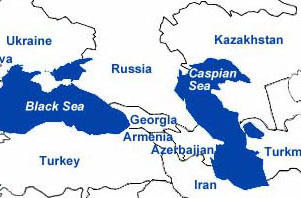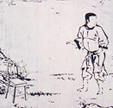America, Inc.
On August 6, 1945, Colonel Paul Tibbets flew a B-29 bomber, the Enola Gay, over Hiroshima and dropped an atomic bomb. Something about that has long puzzled me. How did he ever make it to his target? Why didn’t the Japanese shoot him down?
Three days later, Captain Fred C. Bock flew the Bockscar over Nagasaki and dropped a second atomic bomb. Certainly by then, the Japanese knew what a bomber could do. Why didn’t they scramble fighters and try to stop him?
The answer is simple. They couldn’t.
President Harry S. Truman polled his top generals about use of the atomic bomb against Japan. General Dwight D. Eisenhower voted against it. In Eisenhower’s opinion, the war in the Pacific was over. Japan was almost out of oil; in three months, they would be completely out of oil. Japan has no domestic oil resources; the U.S. had interdicted all of Japan’s foreign supplies. The Japanese didn’t send fighter planes against the Enola Gay because they were out of aviation fuel.
In 1941, when Japan attacked Pearl Harbor, there were no kamikaze pilots crashing into ships. They dropped their bombs and fired their bullets and returned to their aircraft carriers. Kamikazes came later in the war, when Japan was running low on fuel. It simply wasn’t cost effective for planes to fly round-trip, so Japanese planes took off with just enough fuel to reach their targets. Once they had exhausted their ammunition, the planes were only useful as guided missiles. The pilots could crash in the ocean or they could crash into an enemy ship; but one way or another, they were going to crash.
The fear of massive U.S. casualties in an invasion of Japan was generated to rationalize use of the atomic bomb. We weren’t going to invade Japan; there was no need. The U.S. high command understood that the war in the Pacific was over. We would soon be able to sit off their coast and bombard them at will. They wouldn’t be able to send a plane against us; they wouldn’t be able send a ship against us. They were toast.
Adolph Hitler invaded Russia. Like Napoleon Bonaparte, Hitler found Russian winter a formidable foe. But the key German defeat was not at Moscow or Stalingrad. Hitler was desperate to capture the Baku oil fields in Azerbaijan, by the Caspian Sea. Germany and Japan had the same problem — how to get fuel.

The German advance on Baku came close to success — so close that the retreating Russians set fire to the oil fields to deny German access, at least temporarily. When the Germans failed to take the region, their capitulation in Europe was only a matter of time. Allied air raids in 1944 and 1945 reduced German aviation fuel production by 90%. Without foreign sources of petroleum, Germany’s fate was sealed. Sooner or later, they would be toast.
The Bush administration entered the White House in 2001; and Vice-President Dick Cheney held secret meetings on energy policy. He declined to reveal the nature of the meetings; he even refused to identify the participants. Gradually, however, some details surfaced. In February of 2001, less than a month after Bush took office, Cheney was meeting with oil men and studying maps of oil fields in Iraq.
Ever since the transition from coal burning ships to oil burning ships, the Western powers have been meddling in the middle-east because that’s where the oil is. We’re meddling in Venezuela because Venezuela has oil. Tv evangelist Pat Robertson recommended assassinating the president of Venezuela. I’ve no doubt that elements of U.S. intelligence are in complete agreement.
When Iran nationalized its oil industry in 1951, England established a blockade in the Persian Gulf. The U.S. Central Intelligence Agency set up Operation Ajax to destabilize the Iranian government. The result was a coup which brought down Dr. Mohammed Mossadegh in 1953. The U.S. alternately supported Iraq and Iran during their eight-year war because, in the view of Henry Kissinger, we wanted both sides to lose very slowly.
In the past fifteen years, the U.S. has invaded Iraq twice. The goal is not to establish democracy or free markets; the neo-cons are opposed to democracy and free markets. The goal is to control the distribution of oil, because oil is critical to modern warfare. And during the so-called New American Century, the neo-cons anticipate several wars to expand and secure America, Inc.
Three days later, Captain Fred C. Bock flew the Bockscar over Nagasaki and dropped a second atomic bomb. Certainly by then, the Japanese knew what a bomber could do. Why didn’t they scramble fighters and try to stop him?
The answer is simple. They couldn’t.
President Harry S. Truman polled his top generals about use of the atomic bomb against Japan. General Dwight D. Eisenhower voted against it. In Eisenhower’s opinion, the war in the Pacific was over. Japan was almost out of oil; in three months, they would be completely out of oil. Japan has no domestic oil resources; the U.S. had interdicted all of Japan’s foreign supplies. The Japanese didn’t send fighter planes against the Enola Gay because they were out of aviation fuel.
In 1941, when Japan attacked Pearl Harbor, there were no kamikaze pilots crashing into ships. They dropped their bombs and fired their bullets and returned to their aircraft carriers. Kamikazes came later in the war, when Japan was running low on fuel. It simply wasn’t cost effective for planes to fly round-trip, so Japanese planes took off with just enough fuel to reach their targets. Once they had exhausted their ammunition, the planes were only useful as guided missiles. The pilots could crash in the ocean or they could crash into an enemy ship; but one way or another, they were going to crash.
The fear of massive U.S. casualties in an invasion of Japan was generated to rationalize use of the atomic bomb. We weren’t going to invade Japan; there was no need. The U.S. high command understood that the war in the Pacific was over. We would soon be able to sit off their coast and bombard them at will. They wouldn’t be able to send a plane against us; they wouldn’t be able send a ship against us. They were toast.
Adolph Hitler invaded Russia. Like Napoleon Bonaparte, Hitler found Russian winter a formidable foe. But the key German defeat was not at Moscow or Stalingrad. Hitler was desperate to capture the Baku oil fields in Azerbaijan, by the Caspian Sea. Germany and Japan had the same problem — how to get fuel.

The German advance on Baku came close to success — so close that the retreating Russians set fire to the oil fields to deny German access, at least temporarily. When the Germans failed to take the region, their capitulation in Europe was only a matter of time. Allied air raids in 1944 and 1945 reduced German aviation fuel production by 90%. Without foreign sources of petroleum, Germany’s fate was sealed. Sooner or later, they would be toast.
The Bush administration entered the White House in 2001; and Vice-President Dick Cheney held secret meetings on energy policy. He declined to reveal the nature of the meetings; he even refused to identify the participants. Gradually, however, some details surfaced. In February of 2001, less than a month after Bush took office, Cheney was meeting with oil men and studying maps of oil fields in Iraq.
Ever since the transition from coal burning ships to oil burning ships, the Western powers have been meddling in the middle-east because that’s where the oil is. We’re meddling in Venezuela because Venezuela has oil. Tv evangelist Pat Robertson recommended assassinating the president of Venezuela. I’ve no doubt that elements of U.S. intelligence are in complete agreement.
When Iran nationalized its oil industry in 1951, England established a blockade in the Persian Gulf. The U.S. Central Intelligence Agency set up Operation Ajax to destabilize the Iranian government. The result was a coup which brought down Dr. Mohammed Mossadegh in 1953. The U.S. alternately supported Iraq and Iran during their eight-year war because, in the view of Henry Kissinger, we wanted both sides to lose very slowly.
In the past fifteen years, the U.S. has invaded Iraq twice. The goal is not to establish democracy or free markets; the neo-cons are opposed to democracy and free markets. The goal is to control the distribution of oil, because oil is critical to modern warfare. And during the so-called New American Century, the neo-cons anticipate several wars to expand and secure America, Inc.


<< Home